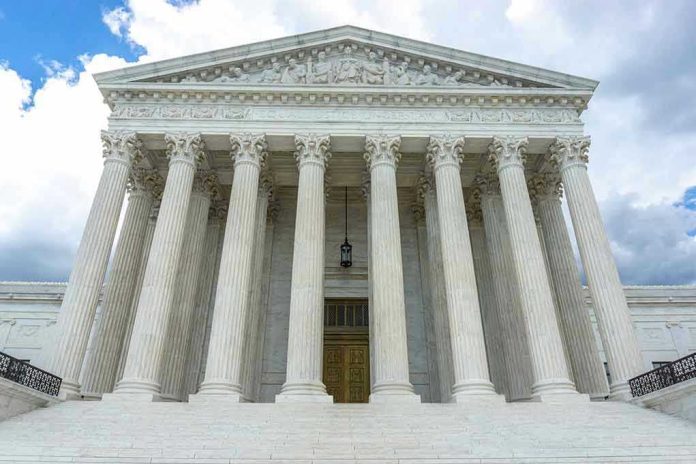
In a landmark decision, the Supreme Court has empowered President Trump to immediately fire a Biden-appointed FTC commissioner, raising fundamental questions about the future of federal agency independence and executive authority.
Story Snapshot
- The Supreme Court granted Trump immediate power to remove FTC Commissioner Rebecca Slaughter, bypassing longstanding job protections.
- This decision directly challenges the 1935 precedent that limited presidential removal powers over independent agency officials.
- The Court will soon decide whether agency independence protections violate constitutional separation of powers.
- Liberal justices dissented, warning of harm to agency autonomy and regulatory stability.
Supreme Court Grants Trump Authority Over FTC Leadership
The Supreme Court issued a stay that allows President Trump to remove Rebecca Kelly Slaughter, a Biden-appointed Federal Trade Commission commissioner, without showing cause. This action overturns a district court order from July that had blocked Trump’s attempt to fire Slaughter. The Supreme Court’s expedited ruling signals a potential shift in the balance of power between the executive branch and independent federal agencies, making immediate changes to the FTC’s leadership and policy direction.
The FTC, created in 1914, has operated with commissioners enjoying statutory job protections since 1935, when the Supreme Court decided in Humphrey’s Executor that Congress could restrict the president’s ability to remove agency officials. Trump’s move directly confronts these protections, reflecting a broader conservative push for greater presidential control over federal agencies and policy. The current dispute is part of ongoing legal debates about the “unitary executive” theory, which asserts that the president should have broad authority to direct all executive branch operations, including independent commissions.
Constitutional Challenge to Agency Independence
The Supreme Court’s stay not only enables Trump’s immediate removal of Slaughter but also sets the stage for a major constitutional debate. The Court will consider whether statutory removal protections for FTC commissioners violate the separation of powers, and whether the Humphrey’s Executor precedent should be overturned. Recent cases, such as Seila Law LLC v. CFPB in 2020, have already chipped away at agency independence by limiting protections for single-director agencies. Overruling Humphrey’s Executor could fundamentally alter the structure of federal regulatory bodies, granting future presidents far more control over independent agencies like the FTC, SEC, and FCC.
Liberal justices Kagan, Sotomayor, and Jackson dissented from the Court’s decision, cautioning that the stay could cause “immediate and irreparable harm” to agency independence. Their dissent underscores ongoing concerns that increased presidential power may politicize regulatory enforcement, undermine agency expertise, and reduce the checks and balances that are central to the constitutional system. If agency independence erodes, regulated industries could face greater uncertainty, and consumers may lose protections that have been in place for decades.
Implications for Conservative Values and American Governance
For conservatives, the Supreme Court’s action is widely seen as a victory for executive accountability and constitutional governance. Trump’s ability to remove a Biden appointee from the FTC reflects a commitment to reversing progressive regulatory agendas and restoring presidential authority over federal policy. This decision resonates with frustrations over previous administrations’ use of independent agencies to push leftist policies, increase bureaucracy, and restrict traditional values. Many supporters argue that accountability demands the president be able to select and direct agency leadership, ensuring policies reflect the will of the electorate and respect for constitutional limits.
"JUST IN: Supreme Court Rules Trump Can Fire Biden Appointee From the FTC" – Mediaite #SmartNews https://t.co/PSRInBLQe3
— Chris Silas (@Silas18Chris) September 23, 2025
The broader impact of this case could reach beyond the immediate removal of a single official. If the Supreme Court ultimately overturns Humphrey’s Executor, independent agencies across the federal government may see diminished autonomy, with presidents able to reshape policy direction more rapidly and decisively. While critics warn of instability and politicization, supporters maintain that such reforms are necessary to curb government overreach, reduce regulatory excess, and protect individual liberty and family values from unelected bureaucrats. The outcome of the December 2025 arguments could reshape the federal administrative state for generations, with profound implications for constitutional checks and balances.
Sources:
Supreme Court official opinion (No. 25A264, Trump v. Slaughter, September 22, 2025)



